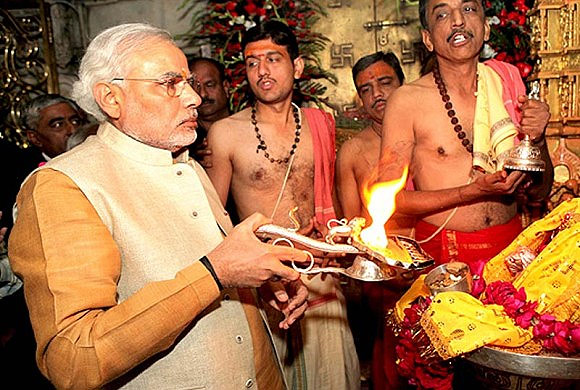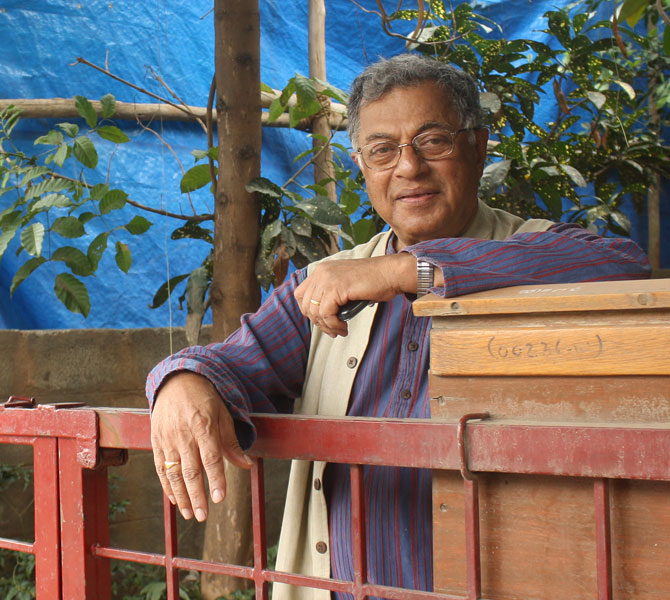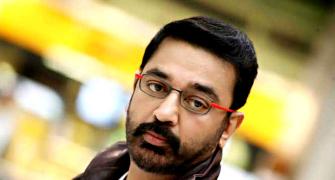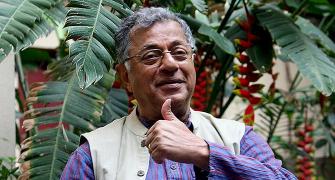Girish Karnad, one of modern India's finest playwrights, has passed into the ages.
Among the first to tweet his condolences was Prime Minister Narendra Modi who said, 'Girish Karnad will be remembered for his versatile acting across all mediums. He also spoke passionately on causes dear to him. His works will continue being popular in the years to come. Saddened by his demise. May his soul rest in peace.'
In this May 2014 interview with Vaihayasi Pande Daniel/Rediff.com, the politically conscious Karnad spoke of why he is concerned about Modi coming to power.
'Democracy is a government by the grumblers. That's why it is a democracy. With the right to grumble.'
'Now both the Congress and Modi have given enough cause for grumbling. How it will be sorted out I don't know. I am just holding my breath.'

Girish Karnad has blistering views about Election 2014.
The playwright has made it plain, in many interviews, that he abhors Narendra Modi's style of politics.
Karnad even campaigned for Congress candidate Nandan Nilekani in the Bangalore South seat and considered campaigning against Modi in Varanasi.
Karnad -- who made headlines a couple of years ago for denouncing V S Naipaul's anti-Muslim stance -- courts controversy if it bolsters a humanitarian view he is fierce about.
His plays have employed mythology and history to shed light on contemporary issues, but he will not make any mythological comparisons in this election because he declares it is too risky.
Girish Karnad spoke to Vaihayasi Pande Daniel/Rediff.com at his Bengaluru home.
What do you think of the Modi phenomenon? If you spoke to anyone from the Bharatiya Janata Party even two weeks ago they told you that a victory was already in the bag. And that Narendra Modi was on the way to becoming prime minister.
That was what they said, in 2004, when (the BJP's) Shining India (campaign) was (happening). (Prime Minister Atal Bihari) Vajpayee had finished his very successful term and (L K) Advani was supposed to take over and they (the BJP) were swept out of power.
Indian democracy is very strange. We shall see what we shall see.
You must remember that this mass hysteria for (Narendra) Modi has also been created by money. He has been the backer of great industrialists. They have poured money into (his campaign). You have got his statues all over the place. It is easy to create that kind of hysteria and make one feel (he is coming).
I personally think that it won't (happen) -- maybe I am fooling myself -- I have been a staunchly anti-Modi man, from the beginning. He may be a good chief minister of Gujarat.
But the question is that he has to give an account of himself. How is it that if Gujarat flourished so much when he was chief minister and he is responsible for it, why is he not responsible for that three days of rioting (too)? He was in charge of the police, he was in charge of the army, he was in charge of the CRPF. His party was in charge. And he says he was not responsible?!
How do you reconcile these completely irreconcilable claims? I think he was responsible.
If he was responsible for the prosperity in Gujarat, we must hold him responsible for the three days of rioting.
I shall stand by it and I think most Indians will see this. What you must also remember is that all those people who hold (a torch) for Modi are the upper crust of Indian society who benefit from development or what's called development by capital coming.
These are not the people working in the fields. These are not the slums. These are not the farm workers.
Certainly it is a fascinating election, even if he becomes prime minister. What is fascinating in this is how, suddenly -- with the feeling that Modi may win -- perfectly intelligent people with integrity jumped ship.
I had seen this happen before, during the Emergency. I was working for the government. I was the director of the Film and Television Institute of India (Pune) in 1974 when the Emergency was declared. I resigned in 1975-1976 because I couldn't bear working for the Ministry of Information (and Broadcasting) at that time. I saw this whole thing (then).
You ask them to bend and they prostrate themselves.
Already, it has (become that situation with Modi). The great intellectuals are saying: 'Yes, yes, it doesn't matter. A few thousand Muslims are killed. It is immaterial. Ultimately, there will be development.' What development? We'll see.
Why do you think Narendra Modi has generated this kind of mass hysteria and why are people mesmerised by him?
One reason, of course, is the enormously disastrous five years we have had under the Congress. (Prime Minister) Manmohan Singh was a disaster in his second term.
In his first term we admired him. We thought he was clean. Efficient.
In the second term he didn't even stand for an election. We are a representative democracy. We have to have an elected prime minister. He was afraid. Clung there like a limpet. The second term was full of scams.
The last time the BJP lost was because (Congress party President) Sonia Gandhi came in like a whirlwind. This time there is nothing like (from the Congress side in this election) that I must grant (because of) the total disillusionment with the Congress and lack of leadership and corruption. And a prime minister who prided himself on not saying anything.
This has created (a feeling that) this (present) set-up cannot go on! (And made people ask) what is the alternative?
Folks who support the Congress feel let down that Congress has not beaten back the Modi Wave in a ferocious enough manner. Would you agree?
Completely. Absolutely.
And (it is because of) this focus on family.
(President) Pranab Mukherjee was a very good candidate. If they had kept him as a prime ministerial candidate he would have had something to say. They pushed him off to become the President so that you know he does not come in the way of Rahul (Gandhi) becoming the prime minister. But Rahul is incompetent.
His sister may be competent. But she is married to another -- well, let's not talk about that... So that's the situation. The point is the main reason (for Modi's ascendency) is the disillusionment with the Congress. They got two terms, they could have done so much...
Manmohan Singh let us down and turned out to be pusillanimous. Mrs (Sonia) Gandhi was, I think, ill most of the time and tried to dominate...
I must say that if they (have even) had two full terms you have to give the credit to Mrs Gandhi. Not to Manmohan Singh. For whatever strings she pulled, she kept it going.
The sad part is that we may now splinter. Everyone thinks Modi might provide the leadership. Have you seen his lectures? (It is all about) Mein karoonga! He is not representing a party. What is the BJP doing? Mein ne usko bhej diya... Mein tumhe... Tum mujh par vishwas karo... This is the real dictator before the dictator has emerged.
Apparently he didn't canvass for (BJP President) Rajnath Singh (in Lucknow) who proposed his name in the party. Shows that the man is already cutting rivals out.
I don't think Modi's term is going to be easy from within the party either. There are too many people who work for the BJP from within. Sushma Swaraj, (Arun) Jaitley, for instance, others who have been sidelined, swept aside.
If Modi brings power they will keep quiet till power comes into their hands. Then how the power is distributed is (the main question).
Why has the upper crust of Indian society jettisoned their conscience to back Modi?
There is an incumbency factor. When a government is in power for two terms everyone gets tired. Everyone thinks the government has let us down. Even if the government has done something, they say they have let us down.
They said that about Congress governments earlier. During (Prime Minister) Rajiv Gandhi's time the whole electronics industry developed. Communications developed. He brought (engineer and policy maker) Sam Pitroda in. No credit is given for what they did at that time.
This happens. This is democracy. Democracy is a government by the grumblers. That's why it is a democracy. With the right to grumble.
Now both the Congress and Modi have given enough cause for grumbling. How it will be sorted out I don't know. I am just holding my breath.
Why have people chosen to forget about the 2002 Gujarat riots? Secularism has become a dirty word.
That's horrible.
That's because being anti-Muslim has been made fashionable by American politics, because of 9/11, (Barack) Obama, Middle Eastern politics, Syria, (George W) Bush. So those who are anti-Muslim and speak anti-Muslim -- and who deny the great legacy of Gandhi and Nehru -- feel they are justified (by the mood internationally). The Americans are also on their side, as it were.
I think it is very sad for us.
It certainly has weakened our moral fibre that people can talk about a thousand Muslims being slaughtered as though it doesn't matter.
But then people say you know the Congress did it (post Indira Gandhi's assassination in 1984). But the Congress apologised. They brought in a Sikh as prime minister, tried to make amends.
This man (Modi) doesn't (give that feeling)... If he really gets total power -- a majority -- we are in for trouble.
Maybe it will not be as bad as it seems. When Indira Gandhi came back to power in January 1980 people were worried that she might bring back the Emergency with her. But that did not happen. Maybe the Muslims might be safer under Modi? But if the opposite happens, there could be a civilisational change in the way India looks at things?
Or a civilisational change in Modi?! (Laughs). He will change, he will embrace Muslims.
What do you think is likely, in your view?
Ultimately every politician has to come to terms with reality. Even if he is elected prime minister he will have to come to terms with the actual reality. The reality might be that in many states there won't be a BJP government. I don't know what will happen in Tamil Nadu and with Jayalalithaa. We don't know what will happen in Bengal.
We are a huge country. Twenty (plus) states. The media might have created this whole Yes Yes Modi Modi.
But has that really happened? Will that really happen? The people who vote in India are not the middle class or the upper class. It is the poor.
If you look at all the constituencies and if you look at who has voted, it has been the poorer sections. In the villages the people treat voting as a kind of utsav (festival).
We are a democracy. We have a right to elect Modi. If we elect Modi, we elect Modi. Then we have to see how it works.

'If it wasn't for the Gujarat riots, Modi would be ideal'
Supposing Modi does come to power and his policies endanger India's secularism and pluralism? Or the aspects of her society that are liberal? What do you think you will be able to do?
I don't think he will survive in power very long (then).
You must remember that there are people within the party willing to pull him down and who will use it at some such occasion.
It is not as if the BJP is monolithic, anti-Muslim. He has already upset enough people in the party. He will come to power. But if he doesn't change -- which I doubt that he can at this stage, he seems to have become a megalomaniac -- I am afraid he won't last as a prime minister.
In the BJP there was also a game (at one time) that there was a Vajpayee face. And there was an Advani faces. There were various faces at one point. They have to also play different strategies to stay in power.
Do you hold Vajpayee equally responsible for the fact that his government never took action against Modi for his role in not controlling the Gujarat riots of 2002?
Oh yes. I think so too. I absolutely think so.
So you don't agree with the BJP stance at all, even if say Advani came to power tomorrow?
Advani couldn't come. He is now 89. Advani was clever. Probably he was more intelligent than Vajpayee. The point is his strategy didn't take into consideration that Sonia Gandhi will storm in.
Everything was laid out. Advani was going to be the next prime minister. She came and sabotaged the whole game. So then for two terms he was out. Then Modi came in. Otherwise, Advani would have been the prime minister.
Advani is a very intelligent man. He would have toned it down. With him I can believe that he would have toned down his politics and turned into a more secular (one). I am not sure that this man Modi even understands.
He has made a success of being ferociously anti-Muslim. He has now suddenly started talking (otherwise), but let us see.
He is not only anti-Muslim, he is anti-Election Commission, he is anti-Constitution, he is anti-his own colleagues.
He is intolerant. He is an intolerant person.
Is there anything you like about Narendra Modi?
If it wasn't for the Gujarat riots, he would be an ideal Indian candidate.
Here is a man who sells tea, or who says he sells tea, who comes up. I would say he is more representative of how Indian democracy should work, rather than Rahul Gandhi, who comes from the top, comes from a family who supports him.
Modi's career is his own making. And we must admire him for that. You can't deny the man's achievement.
I don't like the fact that it is based so obviously on hatred for a section of Indian society... He may have brought Gujarat prosperity. I don't know. I don't deny that. There are people who say it is all fake. But that's another matter.
I think one of the things he regrets most, in his life, are the riots. You must remember that.
 Fanaticism is a very attractive phenomenon'
Fanaticism is a very attractive phenomenon'
But people might have voted for him because of his role in the riots and not in spite of his role in the riots?
Might be.
Did you see him on Karan Thapar's interview (2007) when Thapar said you have an image of a Muslim killer. He asked for a glass of water, drank and left.
Something is bothering him.
Somewhere inside he would have liked to have come as the great saviour rather than as a great killer.
Without that riot he would have swept in by now. There would have been no opposition. He would have just swept in.
It is like Advani. Advani never survived the part he played in the (demolition of the) Babri Masjid. And Vajpayee benefitted.
Even if he becomes prime minister the stink and the black mark, of having been there when the riots took place, will not leave. And at some point his enemies will bring it up.
Public opinion changes. Your family. My family. They can say what they like. The point is that when it is critical his enemies will make use of it and use minority or Muslim sympathy and get him.
Why did you decide to campaign for Nandan Nilekani?
Because I dislike Modi. We have a Congress party here (in Karnataka) you know and I want to support them. They are our hope.
Our chief minister of Karnataka, Siddaramaiah, is a farmer, who came from the dregs. He worked his way up and he represents across the communities and cultures. I think strengthening him will give us an alternate Congress.
The present Congress is a disaster. Rahul Gandhi and all that is a disaster.
I think people like Nandan Nilekani, whom I supported -- if he gets elected -- he is likely to shape the future of the Congress, because he has the wherewithal, the intelligence, the international background, the recognition. That's why I supported him.
I think someone like him should be brought into Indian politics. We should have farmers like the present chief minister, but we should also have Nandan Nilekanis. That is most important.
If you were to look at it mythologically, who does Narendra Modi represent?
Mythology is dangerous.
You can use it as you like and call him a rakshasa (demon) and so forth. I would rather stick to the facts as it were. There were people who quoted the Bhagavad Gita to justify the slaughter of Muslims... Mythology is very dangerous.
Do you think Hindutva is relevant in India today?
It is something which is happening. You can't shut your eyes.
Our great advantage as a democracy is that we don't have a majority.
Hinduism is not in the majority. That is what the RSS (Rashtriya Swayamsevak Sangh) wants to create. But within Hinduism there are caste and creeds, theories and philosophies and so on. And that will all come up, once power is there (in Modi's hands).
Some members of India's minority communities believe that Modi's popularity comes from the fact that if you scratch a Hindu, feelings of Hindutva can be found hidden beneath. That may not be accurate. Would you not agree?
There is no such thing as a Hindu. He is a political construct. When the chips are down, you will see he will behave as a Parsi or as a south Indian or as a Brahmin or as a Dalit or another which is what makes our democracy work.
We are a federated community. We have our individual identities.
But there are aspects of Muslim fundamentalism in this country which are disturbing.
There are. You have to confront them. Instead of shutting (the community) out and saying that Muslims are all dangerous.
You cannot shut out 15 percent of India's population. (Numerically) they are half the population of the United States. It is not so easy to shut your eyes.
They are quiet at the moment because they are frightened. But if the Muslims organise and they become violent in this country we will have hell.
If 15 percent in the country feel they don't belong to it could be a very dangerous situation.
That is what people like Modi and (Pravin) Togadia (international president of the Vishwa Hindu Parishad) are doing. They are fools. Togadia is an ass.
Will this brand of fascism makes other types of fanaticism grow?
You have the whole history of Germany in the 1930s to go back to.
The Jews who were rounded up in small towns were not rounded up by (Nazi) party cadres. The German teachers, who taught in schools, rounded up the Jews.
Fanaticism is a very attractive phenomenon.









